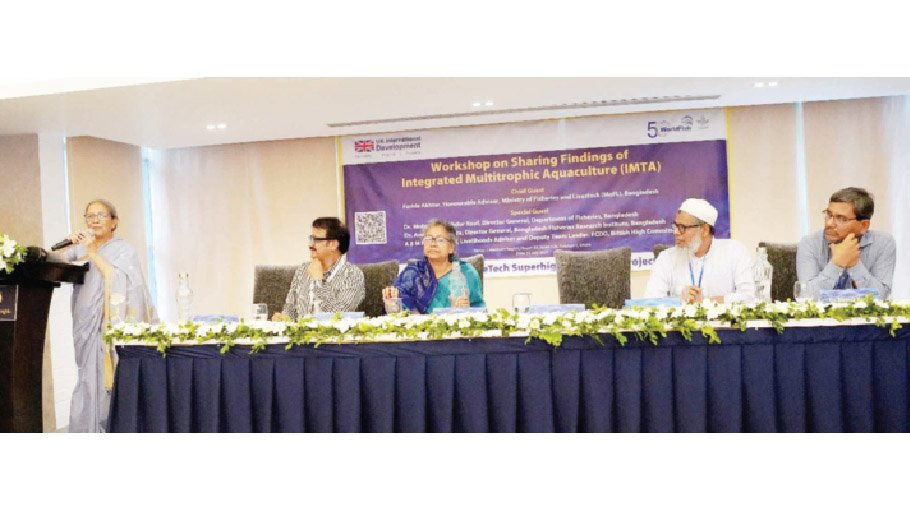Fisheries sector plays key role in boosting economy, food security
Experts say at WorldFish workshop in Dhaka

Speakers at a workshop observed that the country's fisheries sector plays significant role in economy and food security, but still the sector faces growing threats from climate change and resource degradation.
WorldFish Bangladesh hosted the day-long workshop on Integrated Multitrophic Aquaculture (IMTA) on Thursday at a city hotel, aiming to share new research and explore sustainable solutions.
Held under the Asia–Africa BlueTech Superhighway (AABS) project—funded by the UK Government’s Blue Planet Fund—the workshop brought together policymakers, researchers, private sector leaders, and development partners.
IMTA, one of the project’s four focus areas, is emerging as a climate-smart approach to coastal aquaculture.
IMTA integrates the farming of fish, shellfish, and seaweed in a single system, where waste from one species nourishes another. This mimics natural ecosystems, enhancing productivity while reducing environmental impact.
The workshop was graced by Farida Akhter, Adviser to the Ministry of Fisheries and Livestock, as Chief Guest, with S. M. Rezaul Karim (DoF) and Dr. Anuradha Bhadra (BFRI) as Special Guests.
Key research findings were presented by Assaduzaman (CVASU) shared insights from Cox’s Bazar’s marine and pond-based IMTA.Dr. Lifat Rahi (Khulna University) discussed low salinity pond IMTA.Dr. Tareq Arafat (Khulna University) addressed saline pond systems. Dr. Subrata Sarker (SUST) highlighted climate implications of aquaculture.
Nurul Azam outlined the IMTA value chain and its economic potential.
Dr. Abdul Baten Bhuyain (WorldFish) presented suitability mapping for scaling IMTA.
Dr. Faruk Ul Islam, Country Representative of WorldFish, opened the event, stressing the need for science-based, scalable aquaculture models. The program was steered by Dr. Benoy Kumar Barman, Ashoke Kumar Sarker, and the AABS project team.
Beyond the science, the event stood out for its multi-stakeholder dialogue. Representatives from government, academia, business, and development sectors voiced strong support for IMTA as a sustainable path forward.
As Bangladesh pushes toward its Sustainable Development Goals and Blue Economy targets, IMTA presents a timely, eco-friendly solution. The workshop concluded with a call to integrate IMTA into national strategies, paving the way for resilient aquatic food systems.



